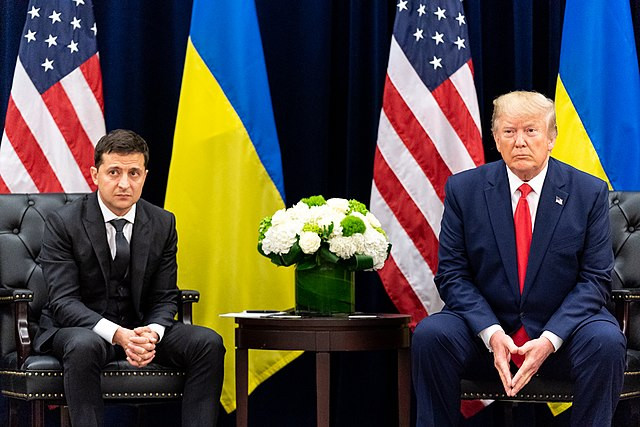Ukrainian President Volodymyr Zelensky issued a public plea on Sunday for former U.S. President Donald Trump to visit Ukraine in the aftermath of a Russian missile strike that killed at least 34 civilians in the northeastern city of Sumy. Speaking in an interview broadcast by CBS, Zelensky urged Trump to witness the devastation firsthand before making any decisions or engaging in negotiations with Moscow.
"Please, before any kind of decisions, any kind of forms of negotiations, come to see people, civilians, warriors, hospitals, churches, children destroyed or dead," Zelensky said. "Come, look, and then let's move with a plan how to finish the war. You will understand with whom you have a deal. You will understand what Putin did."
The appeal followed Sunday's missile assault, one of the deadliest strikes in Ukraine this year. Two Russian Iskander ballistic missiles hit Sumy as residents marked Palm Sunday. According to Zelensky's chief of staff, Andriy Yermak, the missiles carried cluster munitions-explosive submunitions that disperse over a wide area. Ukrainian officials said 34 people were killed and 119 injured, including civilians attending a military award ceremony.
Trump called the attack "terrible" and said Russian forces had "made a mistake," but offered no further elaboration. The Kremlin defended the strike, claiming its military targeted only "military and near-military" sites. Russia's Ministry of Defense stated that "more than 60 Ukrainian troops" were killed in the Sumy strike, which reportedly involved two Iskander-M tactical ballistic missiles.
During the interview, Zelensky also addressed his contentious February meeting with Trump and Vice President J.D. Vance. The exchange, which unfolded at the White House, devolved into a live-on-air confrontation, with Vance accusing Zelensky of misleading visiting officials with "propaganda tours."
"It seems to me that the vice president is somehow justifying Putin's actions," Zelensky said. "I tried to explain, 'You can't look for something in the middle. There is an aggressor and there is a victim. The Russians are the aggressor, and we are the victim.'"
Zelensky warned that "Russian narratives are prevailing in the U.S.," and criticized what he described as "a shift in tone, a shift in reality" within the Trump administration.
Trump previously claimed Ukraine "should have never started it" and labeled Zelensky a "dictator," a claim the Ukrainian leader directly rejected on CBS. "First and foremost, we did not launch an attack," he said. "I don't want to engage in the altered reality that is being presented to me."
The missile strike on Sumy drew international condemnation. Keith Kellogg, Trump's special envoy to Ukraine, said the attack had crossed "any line of decency." Secretary of State Marco Rubio added that the U.S. "extends our deepest condolences to the victims of today's horrifying Russian missile attack," calling it a "tragic reminder" of Trump's continued diplomatic engagement to end the war.
Germany's chancellor-in-waiting Friedrich Merz called the strike "a perfidious act... and it is a serious war crime, deliberate and intended." British Prime Minister Keir Starmer said he was "appalled at Russia's horrific attacks."
On Friday, Trump's special envoy Steve Witkoff met Russian President Vladimir Putin in St. Petersburg. Neither Witkoff nor the Kremlin commented on the outcome of the four-hour meeting, which did not include Ukrainian representation. Witkoff reportedly departed for Oman afterward to engage in related discussions with Iranian officials.
Inside Russia, some pro-Kremlin commentators, including political analyst Sergei Markov, publicly urged Moscow to issue condolences over the civilian deaths. "It would be right for Russia to officially express its condolences now in light of the large number of civilian casualties in Sumy," Markov wrote on Telegram.
Asked whether he believes the U.S. remains committed to Ukraine, Zelensky paused before responding, "The United States is our strategic, strong partner. But the pause is doubt."
"I don't doubt that the people of America are with us," he added. "But in a long war, many details are forgotten. In Europe everyone fears that the United States may drift away from Europe."






